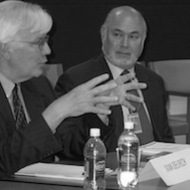A Message from the President
One could reasonably assert that the Nuclear Non-proliferation Treaty (NPT) is the third most important legal instrument of the 20th Century, standing behind the United Nations Charter and the Universal Declaration of Human Rights. Without the NPT, dozens of states would have raised the hazard of nuclear weapons beyond the breaking point. The risk of nuclear annihilation however remains unacceptably high. For that reason, the progress obtained by 187 nations at the May 2010 NPT Review Conference at the UN should be recognized as a significant diplomatic achievement which opens avenues of opportunity– and thus responsibility– for all who are concerned to obtain, in the words of President Obama, the “peace and security of a world without nuclear weapons.”
|
Contents |
|
» Read MORE of the Message from the President…
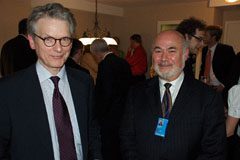 |
|
MPI Chairman Henrik Salander and
|
The Middle Powers Initiative made a material contribution to this success by hosting seven major conferences over the past five years designed to help forge a practical consensus agenda and it is remarkable that agreement was obtained on most of the recommendations arising from this process. (See: Key Points from the 2010 NPT Review Conference Final Document) Also, the momentum of parliaments the world over, in part generated by the extraordinary work of the Parliamentarians for Nuclear Nonproliferation and Disarmament, helped give political support to many diplomats (See: the Compilation of Resolutions Supporting the Secretary-General’s Five Point Plan).
Yet, diplomatic success does not immediately translate into the needed changed practices. Enormous economic allocations to “modernize” the US nuclear weapons complex — $180 billion over the next ten years – is but one nuclear weapons state’s example of the distance between aspiration and realization of downgrading nuclear weapons. The other nuclear weapon states are, with far less funding, similarly engaged in modernization programs. Moreover, military planners in all states with nuclear weapons remain deeply committed to advocating the value of their nuclear missions and appear unwilling to enthusiastically endorse disarmament progress. Thus, the work of civil society advocacy is critically important. Who else can have the privilege of advocating for the global public good without the bureaucratic constraints of representing only one nation? Nuclear weapons represent a clear example of an issue that poses a global threat and thus requires a global security perspective in its advocacy.
» Read MORE of the Message from the President…
The report of GSI’s activities over these past months is so volumnious that we could not squeeze it into one eNewsletter. For instance, the links to the video, press, television and online media reports which feature GSI experts were so numerous, we had to siphon them off here, into a separate supplement that we encourage you to click through. This prolific, committed team of effective advocates deserves our gratitude.

Jonathan Granoff
President
Disarmament and Peace Education Activities
UN Panel Event: Sustainable Security for the 21st Century
On May 10, 2010, the Global Security Institute, with co-sponsorship by the United Nations Department of Economic and Social Affairs, convened a panel of distinguished thinkers and activists at United Nations Headquarters to highlight the connection between the critical path to a sustainable future, which must inlude global disarmament and committed sustainable development for all living beings on the planet. Those in attendance included delegates to the 2010 Non-Proliferation of Nuclear Weapons (NPT) Review Conference as well as voting members and observers to the Commission on Sustainable Development (CSD-18).
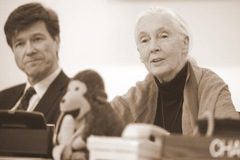 |
|
Dr. Jeffrey Sachs and Dr. Jane Goodall |
|
The panel featured GSI President Jonathan Granoff, Dr. Jane Goodall, UN Messenger of Peace and founder of the Jane Goodall Institute, Dr. Jeffrey Sachs, Director of the Earth Institute and Senior Adviser to former Secretary-General Kofi Annan, and Ambassador Thomas Stelzer, the UN Assistant Secretary-General for Policy Coordination and Inter-Agency Affairs. Mr. Stelzer’s career has taken him to the forefront of the disarmament movement as Austria’s Permanent Representative to the International Atomic Energy Agency and as Special Assistant to the Executive-Secretary of the Comprehensive Nuclear Test-Ban Treaty Preparatory Commission.
The event was broadcast around the world via UN-TV.
» Read the Event Report
» Watch the UN-TV Webcast
» View the photo gallery
Calling for Cooperation in Iran
 |
|
Over 60 countries were represented at the April 17-18 Tehran conference on Disarmament and Non-Proliferation hosted by the Foreign Ministry of Iran. GSI President Jonathan Granoff delivered his presentation, “Everyone,” and had the opportunity of speaking on several nationally-broadcast news programs, where he countered widely held misperceptions of President Obama’s arms control agenda.
» Read Mr. Granoff’s presentation, “Everyone”
» Watch Mr. Granoff’s interview on Press-TV
» Watch Fine Point, an hour-long Iranian evening news show, featuring a conversation with Alexander Pikayev of the Carnegie Moscow Center, Dr. Gunnar Westberg of International Physicians for the Prevention of Nuclear War, Prof . Mohammad Marandi of the University of Tehran and Mr. Granoff.
» Read Western and Chinese (English language) press reports of the conference
The Middle East and the NPT
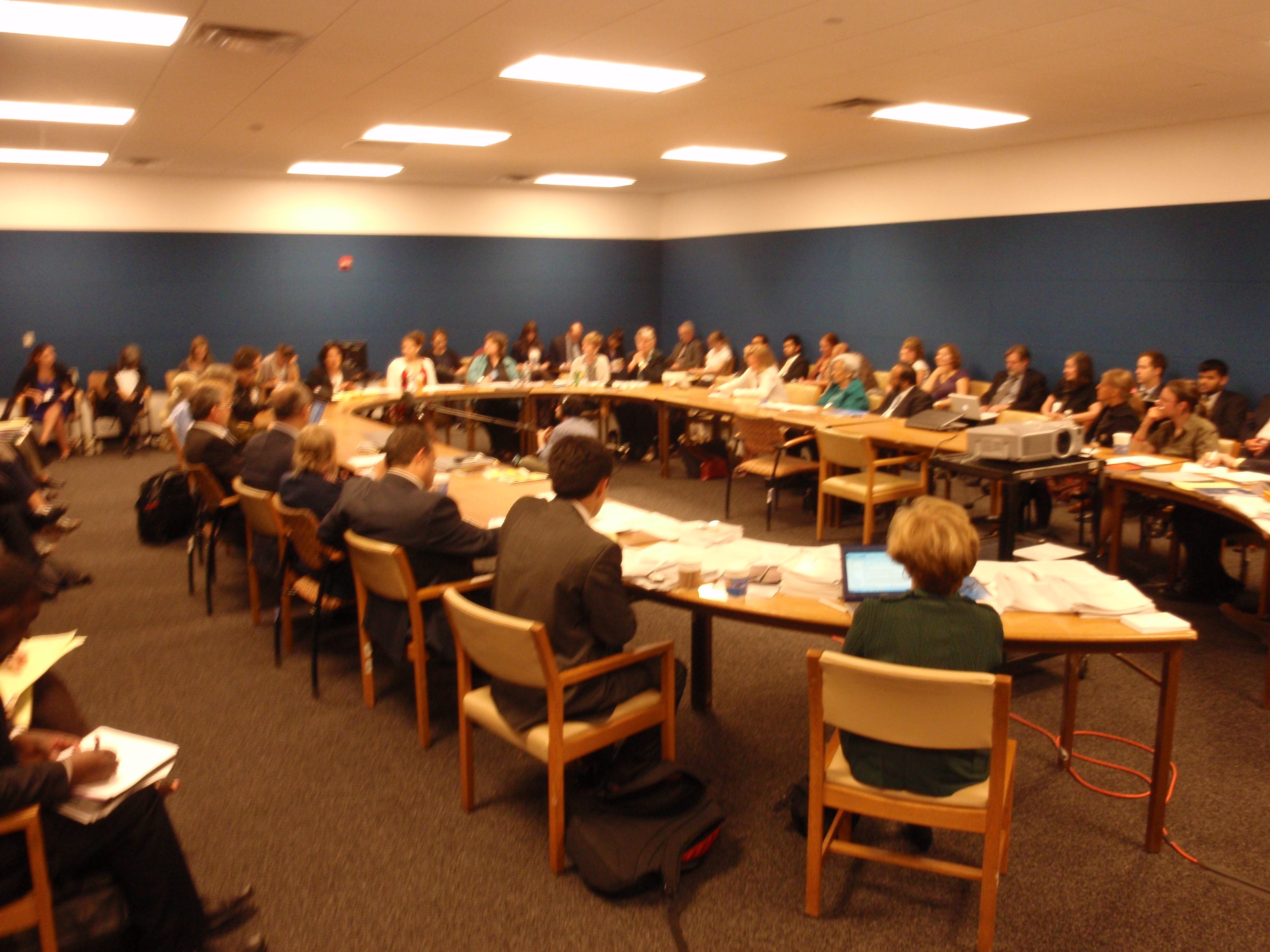 |
|
For the second time this NPT cycle, GSI Senior Officer Rhianna Kreger had the honor of chairing a UN event focused on the Middle East, held at the height of the NPT negotiations, the success of which depended largely on finding agreement on ways to advance progress in the Middle East. MPI Expert Consultant Rebecca Johnson, Executive Director of the Acronym Institute, along with Anne Penketh of the British-American Security Information Council and Sharon Dolev, head of the Tel Aviv office of Greenpeace, presented.
The session was remarkable, not only in its prescient timing and full-to-capacity seating, but namely due to the robust participation from delegations– including at the ambassadorial level, including countries such as Egypt, Jordan etc. It was also one of the rare opportunities for delegates to hear, albeit unofficial, Israeli perspectives on a Middle East Nuclear Weapon-Free Zone and general challenges to peacemaking and peacebuilding in the region. (As it was an NPT event and Israel is not a party to the NPT, there was no official Israeli representation.)
Greenpeace-Mediterranean, the organizers of the event, streamed the entire session on the Internet.
» Watch the webcast of the event
» Read Rebecca Johnson’s brief
NPT Strategy Session
 |
|
Daryl Kimball and Katie Matthews field questions from the audience. Jonathan Granoff moderates. |
Over 75 representatives from governments, non-governmental organizations (NGOs) and the UN convened on Tuesday March 16 at a GSI-convened strategy session on the nuclear Non-Proliferation Treaty (NPT) Review Conference. The session, chaired by GSI President Jonathan Granoff, focused on recent and prospective developments in Washington and how they may affect the RevCon.
BSG Director Robert Grey, Jr., Daryl Kimball of the Arms Control Association and Dr. Kathryn Matthews of the Office of Representative Edward Markey presented.
» Read the Event Report
» View the Photo gallery
» Read Amb. Grey’s presentation
» Read Daryl Kimball’s presentation
» Download ACA’s Proposals to Strengthen the Non-Proliferation Treaty, 2010
Special thanks go to the Baha’i International office for the generous use of their facility.
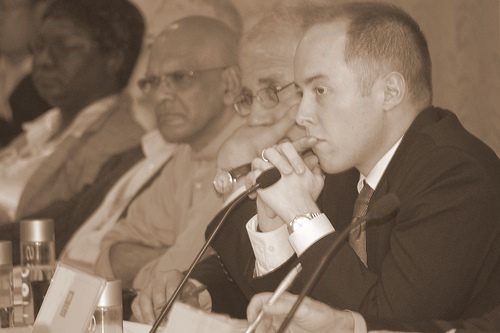 |
|
Rev. Tyler Wigg-Stevenson, Executive Director of Two Futures Project, Swami Parameshananda and Tad Daly of International Physicians for the Prevention of Nuclear Warphoto credit: RfP |
|
Principles, Values and Global Security
Religious leaders from around the world gathered at the International Peace Institute on May 5 for an afternoon roundtable titled “Principles, Values and Global Security.” GSI Board Member Rev. Tyler Wigg-Stevenson of the Two Futures Project and GSI President Jonathan Granoff were among the presenters at this event co-sponsored by Religions for Peace.
The roundtable discussed the contributions and commitment of faith communities to nuclear disarmament and non-proliferation. It examined the role played by religious leaders and people of faith in addressing the risks posed by nuclear weapons and in discussing efforts to promote disarmament and to prevent the proliferation of those weapons.
» Read Rev. Wigg-Stevenson’s keynote at the MPI Atlanta Consultation
» Read Jonathan Granoff’s presentation, “A Good Framework for a Good Future“
Engaging Students
Recently, GSI participated in several university events aimed at students and academics of a wide range of ages:
- On March 2, Mr. Granoff gave several presentations to over 1,000 students at Model UN events at the United Nations and in in Brooklyn, NY, convened by the Montessori School systems.
- A consortium of Catholic colleges and universities organized a day-long consortium titled Disarming for Peace and Development, held March 26 at the Salvation Army on E.52nd street, New York City. Jonathan Granoff delivered a presentation on “Arms Control and National Security.” Ray Acheson of Reaching Critical Will and Alison Pytlak of Religions for Peace also presented.
 |
|
High Representative Duarte listens to Dr. John Burroughs’ presentation |
- On February 25, the Fordham International Law Journal and the Non-proliferation, Arms Control & Disarmament Interest Group of the American Society for International Law hosted a one-day conference titled, “Nuclear Weapons and International Law: A Nuclear Non-proliferation Regime for the 21st Century.” The conference explored the direction and the future of the global non-proliferation regime in the wake of North Korea, Iran and the 2009 US-India agreement. Mr. Granoff and MPI Member John Burroughs of Lawyers’ Committee on Nuclear Policy were featured speakers at this event, along with Deepti Choubey of the Carnegie Endowment for International Peace, former US Ambassador to the IAEA Gregory Schulte and other noted experts. UN High Representative Duarte provided the keynote address. » Click here for the program
-
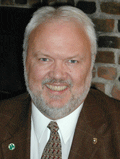
David Ives, Albert Schweitzer Institute
In an effort to raise awareness of key issues regarding the legal, scientific and political aspects of non-proliferation in the 21st century, Quinnipiac University School of Law‘s International Human Rights Law Society in collaboration with the Albert Schweitzer Institute hosted the conference, “Building Up or Breaking Down: The Direction of Nuclear Non-Proliferation,” in anticipation of the 2010 Review Conference of the Parties to the Treaty on the Non-Proliferation of Nuclear Weapons (NPT) conference at the UN in May. The conference was organized by MPI International Steering Committee member David Ives, Executive Director of Quinnipiac’s Albert Schweitzer Institute. Panelists at the conference included: High Representative for Disarmament Affairs Sergio Duarte; Dr. John Burroughs of the Lawyers’ Committee on Nuclear Policy; Newell Highsmith, Assistant Legal Adviser for Non-proliferation, Verification and Arms Control at the State Department; and other non-governmental experts. Jonathan Granoff, President of the Global Security Institute, delivered the keynote presentation.
» Watch a streamed video of the conference
» Learn more about the conference.
» Read Jonathan Granoff’s chapter from the book, Reverence for Life Revisited: Albert Schweitzer’s Relevance Today, published by Cambridge Scholars Publishing. Click here for more information about the book including excerpts such as GSI Advisory Board member Jane Goodall’s chapter.
Middle Powers Initiative Activities
The Middle Powers Initiative at the NPT Review Conference
 |
|
MPI Chairman Henrik Salander with NPT President Libran Cabactulan |
MPI exercised a variety of tools to help ensure a meaningful outcome to the NPT Review Conference:
- In April, MPI issued a set of Recommendations culled from over six Article VI Forum conferences and the Atlanta Consultation III;
- On May 18, MPI co-hosted, with the South Korean Mission, a closed-door strategy session for middle power governments;
- On May 16, MPI organized a strategy session for NGOs, with a presentation by MPI Expert Consultant Jayantha Dhanapala;
- Various MPI leaders and Steering Committee members held numerous private consultations with delegates throughout the Review Conference;
- Over 75 governmental, non-governmental and UN delegates attended MPI’s reception held on May 5 in honor of NPT President Libran Cabactulan.
Several MPI experts delivered presentations to the official NPT plenary on May 7, including:
- “The path to a nuclear-free world: the case for a Nuclear Weapons Convention,” delivered by Rebecca Johnson, Acronym Institute for Disarmament Diplomacy
- Statement by Jayantha Dhanapala, US Institute of Peace Fellow
- “Issues related to nuclear disarmament and non-proliferation,” delivered by John Burroughs, Lawyers Committee on Nuclear Policy
- Speech by Tadatoshi Akiba, Mayor of Hiroshima at the NPT Review Conference
A full listing of all of the excellent NGO presentations can be found at Reaching Critical Will.
In addition, MPI member groups also conducted their own distinct activities throughout the Review:
- The Reaching Critical Will project of the Women’s International League for Peace and Freedom published daily reports from the RevCon and coordinated much of the civil society presence in New York;
- The International Network of Engineers and Scientists for Global Responsibility organized mock debates for German youth;
- The International Association of Lawyers against Nuclear Policy (IALANA) held two side events on May 12, “Law Vs. Doctrine: Assessing US and Russian Nuclear Postures,” featuring IALANA Vice-President Peter Weiss, LCNP Treasurer Charles Moxley and Alicia Godsberg of the Federation of American Scientists, and “Nuclear Weapons Convention and the NPT: Legal Challenges and Prospects,” featuring German IALANA member Robin Borrman, MPI ISC member Jurgen Scheffran and Stefan Kordasch from the German Ministry of Foreign Affairs.
MPI Delegation to Seoul, Republic of Korea
From March 10-11, MPI Chairman Henrik Salander and Chairman Emeritus Douglas Roche traveled to Seoul, Soth Korea to participate in the Summit of Honor on Atoms for Peace and the Environment (SHAPE), an international conference hosted by the Ministry of Foreign Affairs.
 |
|
(L-R): Senator Roche, Ambassador Salander and Mr. Hyun Cho, Deputy Minister of Multilateral and Global Affairs |
In their respective speeches, Ambassador Salander and Senator Roche called on the international community– particularly middle power countries– to follow the MPI recommendation to “press for the NPT Review Conference to adopt a commitment to commence preparatory work, deliberations and negotiations on a convention or framework of instruments for sustainable, verifiable and enforceable global elimination of nuclear weapons.”
The SHAPE conference final statement, which was drafted by Conference Co-Presidents Kim Young Sam, former President of South Korea, and Dr. Mohamed ElBaradei, former Director-General of the International Atomic Energy Agency, supported the commencement of such preparatory work on a nuclear weapons convention.
Also while in Seoul, the MPI leaders held meetings with the foreign ministry and the parliament.
» Read the SHAPE conference final statement
» Read Ambassador Salander’s statement
» Read Senator Roche’s statement
» View the photo gallery of the meetings
» MORE…
Bipartisan Security Group Activities
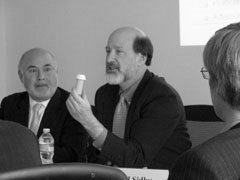 |
|
Dr. Kellman holds up a bottle of white powder sugar, which should be suspected by security officials of anthrax, but is not. |
|
Global Responses to Biological Terror
On April 15, 2010, the Global Security Institute and the EastWest Institute co-sponsored a policy roundtable for diplomats, NGOs, and private sector associates on strengthening the global regime to combat biological weapon threats. The panel featured international law expert Barry Kellman of the International Security and Biopolicy Institute. Dr. Kellman, a founding member of GSI’s Washington-based Bipartisan Security Group, provided the attendees a clear overview of the current threats of biological weapons and outlined an ideal and practicable work plan for the upcoming 7th Biological Weapons Convention Review Conference set to take place at the end of 2011. Professor Kellman posed the very important question, “How can we begin a process of discussion with diplomats internationally to frame this [biological weapons] issue in a way such that the [BWC Review Conference] process can be optimal?”
» Read the Event Report
» View the photo gallery
 |
|
BSG Member James Goodby |
|
The United States Nuclear Posture Review: Analysis and Opportunities for Progress
In early April, the Obama administration released the Nuclear Posture Review (NPR), a document that will inform and guide US nuclear weapons policy for the next 5-10 years. On May 11th, BSG hosted a symposium at the UN to offer insights and analysis of the document to the international delegations participating in the Review Conference. GSI President Jonathan Granoff chaired the discussion. He was joined by founding BSG member Ambassador Jim Goodby and Dr. Ivan Olerich of the Federation of American Scientists.
Ambassador Goodby opened the discussion noting that this NPR, the third since the end of the Cold War, was written by a President who truly believes a world without nuclear weapons is not only possible, but desirable. It contains a nuanced but significant shift in rationale for the continued possession of nuclear weapons. Since the end of World War II, US nuclear weapons were developed and maintained as a defense against Russia and her allies; now the primary mission is to prevent the proliferation of nuclear weapons and the acquisition of them by terrorists. While this shift in rationale was not as significant as some hoped for, it provides the flexibility for a progressive agenda going forward. The NPR calls for the ratification of the CTBT and for a new round of negotiations with Russia to achieve deeper reductions of nuclear weapons. It also narrows the range of conditions under which the US would consider using nuclear weapons and stated the objective of creating the conditions that would allow the US to move to a sole purpose doctrine. The NPR also explicitly forbade the production of new nuclear weapons.
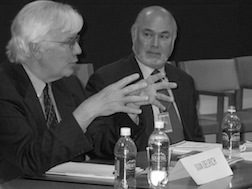 |
|
Ivan Olerich and Jonathan Granoff |
Dr. Olerich pointed out that this was the first unclassified NPR. While he characterized it as an evolutionary rather than a revolutionary document, he noted the domestic political constraints confronting the President. In his opinion, had the NPR gone farther, the prospects for Senate ratification of the new START treaty and CTBT would have been greatly jeopardized. He did not view the shift from Russia towards terrorism as a positive development, noting that the US and Russia possess over 90% of the worlds nuclear weapons making them the greatest obstacle to eliminating these weapons. While he was disappointed that the NPR did not make a not first use pledge or move to reduce the operational status he noted that on every issue it addressed it moved in the right direction.
BSG On The Hill
Throughout the winter and spring, BSG stayed in close contact with members of the Senate Foreign Relations committee offering advice on a number of different initiatives including the Nuclear Posture Review and the NPT RevCon. Led by BSG Director Robert Grey, and assisted by Program Associate Kevin Davis, BSG held numerous meetings with staff in the offices of Senator Kerry, Senator Casey, Senator Gillibrand, Senator Isakson, Senator Risch, Senator Menendez, Senator Cardin, Senator Dodd and Senator Boxer.
As the START debate heats up in the summer Ambassador Grey and Ambassador Graham will draw on their collective experience in government to provide Senators with a broader perspective on the treaty, the first of such meetings took place last week with Senator Risch.
Addressing Biological Threats: Diplomacy and International Programs
On March 18, BSG member Barry Kellman testified to the House Subcommittee on Terrorism, Non-proliferation and Trade, discussing the legal barriers that currently prevent the United States and the international community from working together to prepare for and prevent the use of biological weapons.
» Read the testimony (check against delivery)
» Watch the webcast
On June 10th, a bipartisan group of House Representatives introduced legislation titled the WMD Prevention and Preparedness Act of 2010.
PNND Activities
Secretary-General Ban Ki-moon Gives Keynote at PNND-IPU event at the Review Conference
On May 6, 2010, UN Secretary-General Ban Ki-moon gave an impassioned speech at the United Nations at an event organized by Parliamentarians for Nuclear Non-proliferation and Disarmament (PNND) and the Inter-Parliamentary Union (IPU) on “Advancing Nuclear Disarmament: The Power of Parliaments.”
“You represent those who actually pay for nuclear weapons,” said the Secretary-General,”It is the world’s taxpayers who fund the development and storage of nuclear arms. But tomorrow, in the famous words of John F. Kennedy, due to ‘accident, miscalculation, or madness,’ they could be paying a different — and much higher — price. We must stop this senseless waste of resources… There is a compelling need to start negotiations on a nuclear weapons convention…”
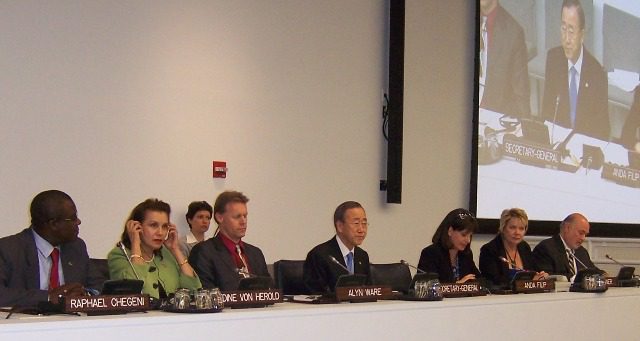 |
|
(L-R): Raphael Chegeni, MP (Tanzania), Edine von Herold, MP (Costa Rica), Alyn Ware (PNND), Secretary-General Ban Ki-moon, Ambassador Anda Filip (IPU), Nicky Wagner, MP (New Zealand) and Jonathan Granoff (GSI). |
Other speakers on the panel included IPU Permanent Observer to the United Nations Anda Filip, PNND Co-President Raphael Chegeni MP (Tanzania), PNND Council Member Edine von Herold MP (Costa Rica) and PNND New Zealand Deputy-Chair Nicky Wagner MP (New Zealand). GSI President Jonathan Granoff served as the respondent to the SG’s remarks.
The event brought the voices of parliaments and parliamentarians to the government delegations and non-governmental observers at the 2010 Non-Proliferation Treaty Review Conference, and urged progress on the UN Secretary-General’s five-point plan for nuclear disarmament – which includes the call for a Nuclear Weapons Convention.
Mr Ban noted that “Ten years ago, the NPT Review Conference described the total elimination of nuclear arsenals as “the only absolute guarantee against the use or threat of use of nuclear weapons.” Mr Ban urged parliamentarians and civil society to “take that message back to your capitals and your governments,” in order to ensure that the NPT Conference takes definite action before it closes on 28 May.
Jonathan Granoff, as the Respondent to the SG’s presentation, offered his gratitude to Secretary-General Ban for framing the challenge of nuclear disarmament as one that requires multilateral cooperation. Such a framing, Mr. Granoff argued, conjoins the moral and practical imperative of meeting this challenge, and effectively links this issue with our similarly shared challenges of meeting the Millennium Development Goals and addressing threats to our climate. Mr. Granoff further thanked the Secretary-General for his “clarity, precision and substance—a Five Point Agenda—that can lead us to the safety, security and moral coherence of a world without nuclear weapons.”
» Watch Secretary-General’s presentation and Mr. Granoff’s response; or you can view just Mr. Ban’s presentation (10 minutes). (requires RealPlayer)
» Read the written text of his speech, “Advancing Nuclear Disarmament: The Power of Parliaments.”
» Read the Secretary-General’s letter from February 24, to all parliaments stressing the importance of the NPT, highlighting his five-point plan, and reminding parliamentarians of their key role in helping achieve the objective of nuclear disarmament. (also available in French and Spanish, with unofficial translations in German, Russian, Japanese, Korean, Portuguese, Arabic.)
» Read the IPU’s report of these activities
Towards a Nuclear Weapon-Free Zone in Northeast Asia
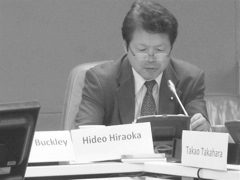 |
|
Hideo Hiraoka MP, Japan |
PNND Members in South Korea and Japan continue to advance the proposal for a nuclear weapon-free zone (NWFZ) in their region.
Led by PNND Council Members Tadashi Inuzuka and Hideo Hiraoka of Japan, Young-ghil Kwon and Mikyung Lee of South Korea, members of both parliaments met in Tokyo on February 28 and adopted a joint declaration supporting the proposal, and welcoming also the efforts of US President Obama and Secretary-General Ban Ki-moon towards achieving a nuclear weapon-free world.
On April 28, at the Civil Society Forum of NWFZs, Mr. Hiraoka announced that 93 MPs from both countries and nearly a dozen political parties have now signed onto the statement.
Parliamentarian support for the Secretary-General’s Five-Point Plan for Nuclear Abolition
The growing international support for a nuclear weapons convention (NWC)– part of Secretary-General Ban’s Five Point Plan– is reflected in, and buttressed by, an increasing number of parliamentary actions on this issue. PNND Members are at the forefront of most of these initiatives:
- MPs from Australia, Austria, Bangladesh, Belgium, Bulgaria, Canada, Cyprus, Czech Republic, Costa Rica, Denmark, Finland, France, Germany, Greece, Ireland, Italy, Japan, Latvia, Luxembourg, Mexico, the Netherlands, New Zealand, Norway, the Philippines, Portugal, the Republic of Korea, Romania, Russia, Scotland, Spain, Sweden, Switzerland, Tanzania, the United Kingdom and the United States have endorsed a Parliamentary Declaration Supporting a NWC, initiated by the European Section of PNND. This declaration was presented to Secretary-General Ban Ki-moon on May 6, and to NPT Review Conference President Libran Cabactulan on May 5.
- The Inter-Parliamentary Union, one of the few international organizations to be granted speaking rights at the 2010 NPT Review Conference, called on the NPT to advance the United Nations Secretary-General’s plan for nuclear disarmament;
» Read the full IPU statement
» Watch the webcast of the IPU presentation by Nicky Wagner MP (requires RealPlayer)
PNND side event at NATO Parliamentary Assembly
PNND organized a roundtable discussion during the NATO Parliamentary Assembly for parliamentarians, government officials and NATO ambassadors to consider the implications of the US Nuclear Posture Review and the 2010 NPT Review Conference outcome on the NATO Strategic Review. PNND Global Coordinator Alyn Ware noted that several aspects of the US NPR should be emulated in the NATO Strategic Review, including reducing the role of nuclear weapons to primarily address nuclear threats, increasing the reliance on non-nuclear elements to strengthen regional security architectures, and initiating a comprehensive national research and development program to support continued progress toward a world free of nuclear weapons. Mr. Ware also noted some of the relevant provisions in the 2010 NPT outcome document (see PNND Update #28).
PNND Council member Marit Nybakk MP (Norway) spoke about the importance of parliamentarians in promoting implementation of the steps and initiatives agreed in the NPT Review outcome. She also spoke about some of the initiatives being taken by Norway to advance the proposal for a Nuclear Weapons Convention and to undertake practical work on verification for a nuclear weapons free world.
» Back to top
In the Media
The experts and leaders in our GSI family have been featured in numerous television interviews and press reports, and have also published an array of op/eds in the global media.
Due to the sheer quantity of these print and video resources, we cannot post them all here (i.e. bandwidth exceeded). Please click here for the full listing.

